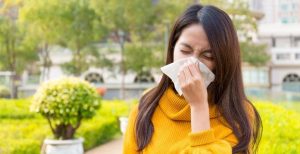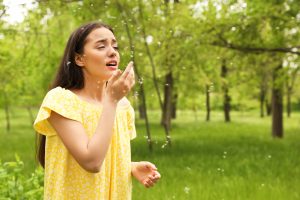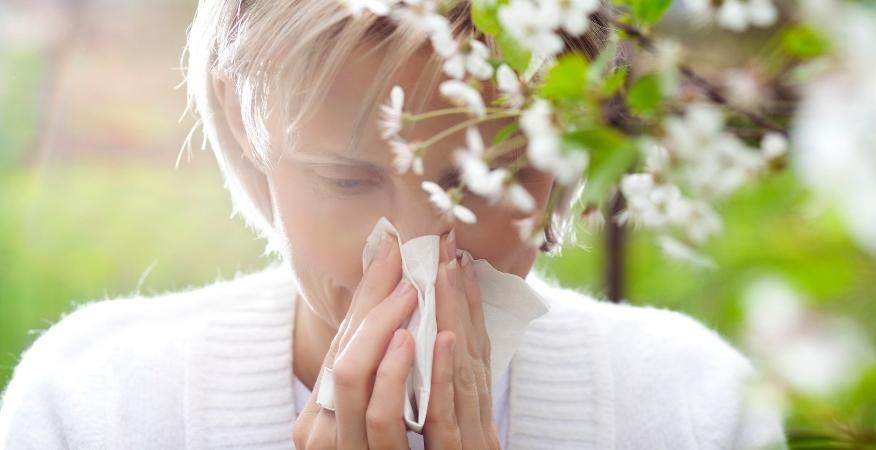Attention for those who are locked in their homes and waiting for the arrival of spring, those who want to experience the joy of spring in outdoor activities. Informing on seasonal allergies that radically affect the lives of children and adults with the coming of spring, Pediatric Allergy, Chest Diseases Specialist Prof. Dr. Ahmet Akçay, President of Allergy Asthma Society, shared the tips for fighting allergens in spring.
Tips on avoiding seasonal allergens
With the arrival of spring, meadow grasses, grasses and trees bloom, pollen is scattered around. Pollen, which is a miracle of nature, helps plants to spread and multiply in the environment, but it can turn the spring months into a nightmare for people with pollen allergies. Individuals who tend to outdoor activities such as camping, hiking, gardening and soil are at risk due to pollen, even if they are in a safer environment in terms of Covid-19.
Prof. Dr. Ahmet Akçay stated that spring allergies disturb the patient very much, impair their quality of life, patients cannot sleep well due to allergic symptoms, therefore they feel fatigue and weakness, as a result of which there is a decrease in concentration and learning ability. She gave everyday tips on how to combat allergens for those with seasonal allergies.
Do not dry your clothes outdoors!
Clothes worn outside should be changed and cleaned when you come home. Drying the clothes in the dryer instead of an outside area, taking a warm shower if possible, gargling the nose with water, especially washing the hair is very useful in terms of cleaning the pollen sticking to the hair. Because pollen can easily settle in the fibers and then trigger symptoms when you wear the laundry.
You must wear a hat and glasses outdoors!
To be successful in the fight against allergies, you can wear a hat on your head and sunglasses to prevent pollen from entering your eyes. The use of masks and sunglasses that cover the sides of the eyes, especially when going out in spring, are effective in controlling spring allergies.
Avoid smoking!
Smoking triggers a stuffy, runny and itchy nose and watery eyes. With the arrival of spring, the time spent in public spaces, parks and gardens increases. While spending time outdoors, it is beneficial to stay away from smoking areas and choose non-smoking collective outdoor spaces, hotel rooms or restaurants. It should be noted that you should avoid other types of smoke that can aggravate your symptoms, such as fumes from a wood-burning fireplace and aerosol sprays.
Follow the weather!
You should follow local weather reports. You can take precautions by noticing the wind during storms on days with high temperatures that cause higher pollen formation. Masks used during the Covid-19 period significantly reduce contact with pollen. These days can possibly cause a phenomenon known as “storm asthma”. Asthmatics can have severe reactions, especially if they go outside after a storm.
 Clear your nose!
Clear your nose!
Nasal rinsing can dilute allergy symptoms in that area as well as clearing mucus from your nose. In addition, it can remove thin mucus and bacteria and alleviate postnasal discharge. It will be helpful to gargle the nose frequently with water. Nose cleaning kits are available. Physiological saline solutions (you can prepare it by putting 1 teaspoon of salt in 1 liter of water) and more concentrated saline (hypertonic saline) solutions can be used for washing the inside of the nose (you can put 2 teaspoons of salt in 1 liter of water); According to one study, the latter has a better effect. The effects of nasal irrigation once or twice a day are felt within the first 4 weeks of starting this practice. It is also important to note that nasal irrigation, in addition to drug therapy, can save approximately 30% on medication while providing the same level of symptom control.
HEPA filters can be used!
Using Portable Hepa “High Efficiency Particulate Arresting”, a filtered air cleaner, vacuuming the house regularly with a HEPA filtered vacuum cleaner, frequently changing the pollen filters of the air conditioner in your car and at home will be useful. Outdoor exercises are important for beating allergies, but timing is critical.
Do not choose the morning hours for walking!
The highest pollen count is usually when the sun starts to rise in the morning. For walking, you should prefer afternoon or late evening hours.
Don’t forget to replace the car filters
The filters installed in all cars today effectively capture particulate matter from ~ 0.7 to 74 µm, regardless of their source. Therefore, even all pollen and pollen particles should regularly prevent them from getting into the car with the windows closed and protect drivers suffering from pollen allergies. A clinical study showing the beneficial effect of car filters during car travel does not appear to have been published to date. On the other hand, there are studies showing that allergies are responsible for up to 7% of traffic accidents, including reflex eyelid closure during sneezing. However – even the best filters in cars wear out and it has been proven that the filtering effect of small particles (PM 2.5) in the outside air is reduced. Those with pollen allergies may be advised to replace the filter every 2 years.
Use effective masks
COVID-era masks reduce contact with pollen. Many people seem to experience fewer seasonal allergy symptoms since wearing masks. It is safe to exercise while wearing a mask. Allergies should not complicate working with the mask, so if you have difficulty breathing you should seek help from a professional. Wearing a mask during the pollen season can be recommended as an effective non-pharmacological option for those with pollen allergies, especially on days when the pollen load is predicted to be high. In this way, pollen allergy sufferers will also have some benefit from wearing a mask against viruses (e.g. coronaviruses), bacteria or air pollution. Unless you have significant nasal congestion, only upper respiratory allergies should not cause too much trouble in breathing. If you have a breathing difficulty, you may need to be evaluated for the possibility of asthma.

Nasal ointments, powders and oils can be used
The application of ointments, powders or oils to the nasal mucosa is based on the idea that they act as a barrier to repel pollen absorbed into the nose or prevent allergens from entering the mucous membranes, thereby preventing inflammatory reactions and symptoms.
Overall, numerous studies show that cellulose dust in the nose is an effective barrier against the penetration of allergens and airborne particulate matter. For these reasons, it may be beneficial for those with pollen allergy to use these ointments around the nose while we are outdoors.
What is the ideal time to exercise outdoors?
Rain pushes pollen down. Exercising during a light rain can be one of the best times to be outdoors when you have allergies.
Is intranasal light (Phototherapy) treatment beneficial?
There are studies showing that intranasal phototherapy is beneficial. However, based on information from dermatology and general considerations of possible epithelial damage to mucous membranes, it should be noted that local application of UV light is not without risk, particularly on a mucosal surface where such application is not physiological. Therefore, it would not be right to recommend this method to every pollen allergy sufferer.
Is Acupuncture effective?
Acupuncture may be valuable for individuals with allergic rhinitis who do not respond adequately to standard drug therapy or who experience intolerable side effects. Presumably, the effect will largely depend on the experience of the acupuncturist and possibly the patient’s willingness to participate in the methodology.



